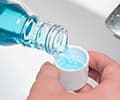What is Dry Mouth?
Your mouth is full of hundreds of minor salivary glands and three sets of major salivary glands that provide saliva to your mouth. Dry mouth (also known as xerostomia) occurs when your salivary glands underproduce.
Besides making sure your mouth feels comfortable and moist, saliva boasts a range of benefits. It provides minerals to the enamel of your teeth, washes out food matter, and supports the soft and hard tissues of your mouth. Together, these factors help prevent cavities and gum disease.
You may notice that you have trouble speaking, swallowing, or chewing when your mouth is dried out, so it's a great idea to stop it in its tracks.
Dry Mouth Risk Factors
The systems regulating your body are impressively interconnected. This means that your salivary glands can be affected by a range of potential sources, from other medical conditions to drug use.
As a general rule, anything that dehydrates you (making you visit the bathroom more) will increase your dry mouth symptoms. Anything that hydrates you (like drinking plenty of water) will decrease your symptoms.
Risk factors for dry mouth include:
- Diabetes, Sjogren's syndrome, and other chronic health conditions
- Medications (prescription and over-the-counter)
- Smoking, use of tobacco products, or illegal drug use
- Alcohol use
- Caffeine consumption
- A history of radiation therapy
- Advanced age
- Nerve damage
- Anxiety
Dry Mouth Complications
A dry mouth is more than an uncomfortable feeling. Because saliva is necessary to the health of your teeth, gums, and mouth, chronic dry may cause:
- Difficulty chewing, speaking, and swallowing
- Tooth and root cavities
- Gum disease (gingivitis and periodontitis)
- Mouth sores
- Cracked lips
- Food and drinks taste different
- Dentures do not easily attach to your gums
- A scratchy voice
- Sore throat
- Bad breath (halitosis)
Dry Mouth Prevention
Keep in mind that because dry mouth can lead to other dental problems, prevention is crucial. Here are some tips for confronting dry mouth to lower your chances of developing associated dental issues.
- Limiting or skipping out on alcohol and caffeine
- Avoiding tobacco products and illegal drugs
- Brushing your teeth for two minutes twice daily and cleaning between your teeth using floss or an interdental cleaner once a day
- Scheduling visits with your dental professional at least twice a year to stay ahead of potential problems
- Consulting with your medical professional about alternatives to medications that cause dry mouth (you mustn't change your dosage on your own)
Dry Mouth Treatment
Steps you can take to treat dry mouth include:
- Drinking more water to prevent dehydration
- Using a humidifier, especially when sleeping
- Chewing sugar-free gum (xylitol) or consuming dairy products to promote saliva production
- Asking your dental professional about using an artificial saliva product or a toothpaste, alcohol-free mouthwash for dry mouth, or gel designed to moisturize your mouth
- Choosing products that contain fluoride, like toothpaste, mouthwash, or water (most tap water contains fluoride!) to help prevent cavities
While dry mouth can be a hassle to deal with, there are an incredible amount of steps you can take to help manage your symptoms. You've done a great job reading up on this health condition and are now ready to prevent dry mouth and related dental problems.
This article is intended to promote understanding of and knowledge about general oral health topics. It is not intended to be a substitute for professional advice, diagnosis or treatment. Always seek the advice of your dentist or other qualified healthcare provider with any questions you may have regarding a medical condition or treatment.
ORAL HEALTH QUIZ
What's behind your smile?
Take our Oral Health assessment to get the most from your oral care routine
ORAL HEALTH QUIZ
What's behind your smile?
Take our Oral Health assessment to get the most from your oral care routine
Join Us
Get the best of your oral health routine and take it to the next level with expert advice, recommendations, products and solutions and special offers.
Join Us
Get the best of your oral health routine and take it to the next level with expert advice, recommendations, products and solutions and special offers.















